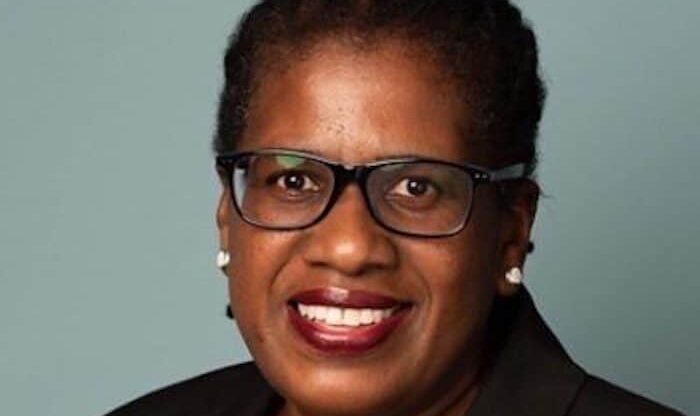Lawyer Allison Bailey turned down work during time she blames Stonewall for loss of earnings

Allison Bailey has announced she will appeal after losing her legal fight against LGBTQ+ charity Stonewall. (Twitter/Allison Bailey)
Allison Bailey took around five months off work during the period she claims her workload “dropped off a cliff” because of discrimination, a tribunal has heard.
Bailey, 52, a lesbian barrister, is currently suing LGBTQ+ rights charity Stonewall and Garden Court Chambers, of which she is a member.
Bailey is a “gender-critical feminist” who founded LGB Alliance, and the Chambers launched an internal investigation over her involvement with the lobby group and over anti-trans social media posts.
At an employment tribunal, which began on 25 April, Bailey has alleged that the chambers is guilty of victimisation and discrimination on the basis of her sex and sexual orientation, and that Stonewall is in part responsible for this alleged discrimination because the chambers was a part of the charity’s Diversity Champions scheme.
In her witness statement, Bailey acknowledged that changes to legal aid rules meant that income had reduced for many barristers in 2019, but claimed that her “practice and income declined so much more steeply than other people’s… as a result of the concerns I had raised about Chambers’ affiliation with Stonewall and the view that I was a transphobe”.
On Monday (9 May), Bailey told the court: “In 2019 my work dropped off a cliff.”
But while Bailey was being cross-examined by Andrew Hochhauser QC, barrister for Garden Court Chambers, he deduced that she had actually been off work for a total of five months during that period.
As noted at the tribunal, barrister’s are usually paid at the end of cases, and Bailey took two-and-a-half months off work between October 2018 and January 2019.
While Bailey said that the time in 2018 should not be counted, Hochhauser insisted that it “affects income”.
Between February and March 2019, she took a month of leave, which she said was to book out her diary “to avoid blockbooking” – smaller cases which would prevent her from taking cases that “pay substantially more, be substantially more professionally demanding and rewarding and would advance my career”.
Addressing a three-day case she turned down in March 2019, she told the court: “I was moving towards having a practice where I could conceive of applying to be a Queen’s Counsel. Having a three-day intent-to-supply case is the sort of case that one would give to a newly qualified barrister or a junior barrister.”
Despite her desire to take bigger cases, Hochhauser noted that she turned down a high-profile Extinction Rebellion case in April 2019. “The case would have brought me no fee at all,” Bailey explained.
Bailey fell ill during a long trial in June 2019, and took a further month off work. And in September 2019, Bailey said she turned down a three-day case because she had “a cold”.
Concluding his cross-examination, Hochhauser told Bailey: “From the end of October 2018 to the end of 2019, you are off for five months.”
“I would have to check that,” Bailey responded.
Hochhauser also pointed out that at least three of Bailey’s cases scheduled for 2019 had to be shifted to 2020 because of the coronavirus pandemic.
By the end of 2019, Hochhauser said Bailey was bringing in more work and even took a three-month murder case, which began on 4 November 2019. Because the case finished at the beginning of 2020, her fee was not included in her 2019 earnings.
Allison Bailey was doing ‘exciting extracurricular stuff’ in 2019, like going on Twitter
During her cross-examination, Allison Bailey was asked about an email she sent to Garden Court Chambers clerk Charlie Tennent, who Bailey said did “most of my clerking” throughout 2018 – she claims her clerking was taken over “in practice” by a more junior clerk in 2019, although this was not formally announced.
In her witness statement, Bailey said Tennent emailed her in September 2019, “to see how I was and how my diary was looking”. She responded saying that she was doing some “exciting extracurricular stuff”.
Asked in court whether this “extracurricular” activity was related to the LGB Alliance, Bailey said it wasn’t, and added: “Magdalen Berns had recently died and I was spending time learning what women were saying around all this… I knew that I wanted to spend some time on Twitter and so on.”
The tribunal continues.

